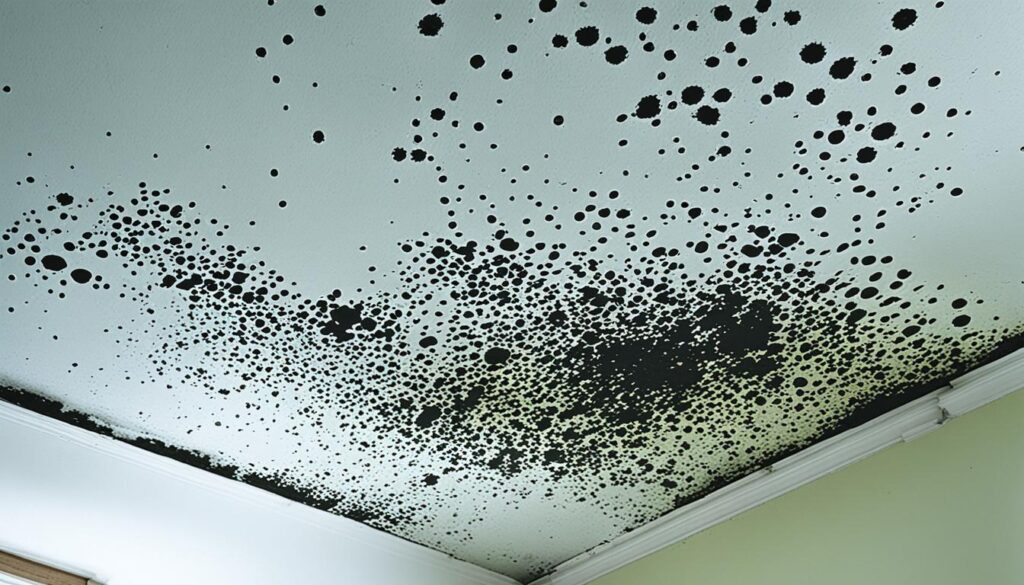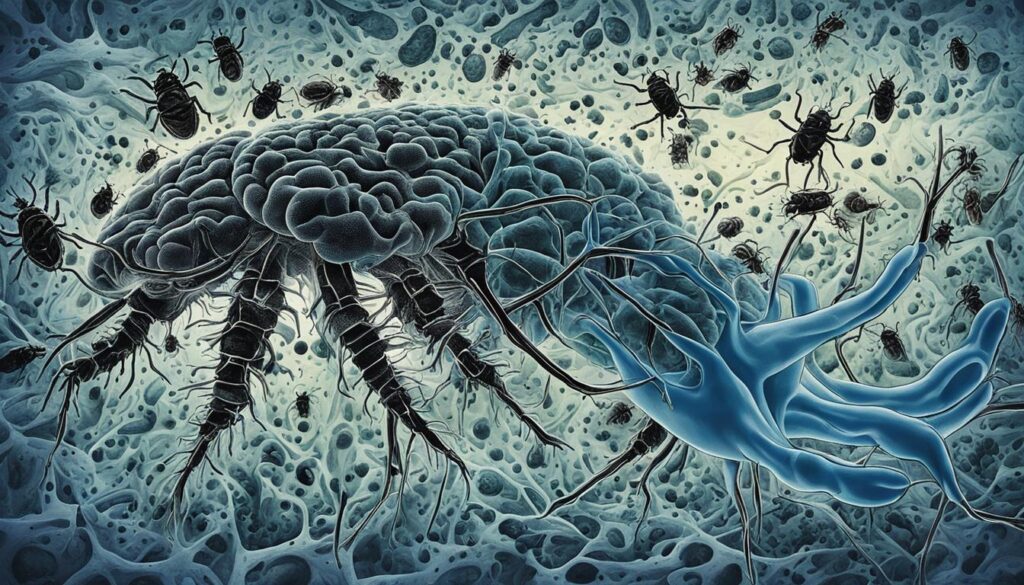
Black Mold Poisoning & Formication Risk Examined
Black mold exposure and its potential health concerns have become a growing topic of concern in recent years. One specific issue associated with black mold poisoning is the occurrence of formication symptoms. Formication refers to the sensation of insects crawling on or under the skin, which can be incredibly distressing and disruptive to daily life. Understanding the link between black mold poisoning and formication risk is essential for individuals who suspect they may be experiencing mold-related health issues.
Exposure to black mold can result in a range of symptoms, including respiratory problems, skin irritation, and allergic reactions. However, the connection between mold exposure and formication is still being studied. Some believe that the presence of mold toxins in the body can trigger sensory nerve stimulation, leading to the sensation of crawling insects on the skin. Others suggest that the psychological impact of living in an environment contaminated with black mold can manifest as formication symptoms.
Regardless of the exact cause, it is crucial to address any mold-related health concerns promptly. The effects of mold toxicity can range from mild discomfort to severe complications, such as neurological symptoms and cognitive impairments. Seeking timely diagnosis and appropriate treatment options can help minimize the potential risks associated with black mold exposure and formication.
Key Takeaways:
- Black mold exposure can lead to formication symptoms, which is the sensation of insects crawling on or under the skin.
- Symptoms of black mold exposure can include respiratory issues, skin irritation, and allergic reactions.
- The exact link between black mold exposure and formication is still being researched.
- Mold toxicity can result in various health complications, including neurological symptoms and cognitive impairments.
- Seeking timely diagnosis and appropriate treatment options is crucial for minimizing the potential risks associated with mold-related health concerns.
Understanding Formication Symptoms and Black Mold Exposure
Formication symptoms, characterized by the sensation of insects crawling on or under the skin, can be unsettling and distressing. When these symptoms are linked to black mold exposure, it becomes essential to explore the potential effects and risks associated with mold toxicity.
Black mold, also known as Stachybotrys chartarum, can release toxic spores into the air, leading to a range of symptoms in individuals who have been exposed. These symptoms may manifest in various ways, affecting different systems of the body.
Symptoms of Black Mold Exposure
- Respiratory issues: People exposed to black mold may experience respiratory problems such as coughing, wheezing, or difficulty breathing.
- Skin irritation: Itchy skin, rashes, or hives may occur as a result of black mold exposure.
- Allergic reactions: Some individuals may develop allergic reactions to black mold, including sneezing, runny nose, watery eyes, or nasal congestion.
- Headaches and fatigue: Black mold exposure has also been associated with persistent headaches and fatigue.
In severe cases, prolonged exposure to black mold can have more serious health effects. These may include neurological symptoms like difficulty concentrating, memory problems, or changes in mood. Individuals with compromised immune systems or pre-existing respiratory conditions may be particularly vulnerable to the harmful effects of black mold.

Identifying the source of black mold and remediation measures are crucial in minimizing exposure and reducing symptoms. Seeking professional assistance for mold testing and removal is recommended to ensure thorough and effective eradication of the mold.
The Effects of Mold Toxicity on General Health
In addition to the specific symptoms associated with black mold exposure, mold toxicity can have broader impacts on general health and well-being. Prolonged exposure to mold can contribute to chronic fatigue, weakened immune function, and respiratory infections.
“The harmful effects of mold toxicity extend beyond the immediate symptoms. Mold-related health concerns have the potential to disrupt daily life and impact overall quality of life,” says Dr. Emily Carter, a renowned environmental health specialist.
To mitigate the effects of mold toxicity, it is crucial to address the underlying cause, which is often excess moisture or water intrusion. Implementing proper ventilation, maintaining optimal humidity levels, and promptly addressing water leaks can help prevent mold growth and reduce the risk of mold-related health issues.
Overall, understanding the symptoms associated with formication and black mold exposure is vital in recognizing the potential risks and effects on health. If you suspect mold-related symptoms or have concerns about black mold exposure, consult with a healthcare professional or a mold specialist for proper evaluation and guidance.
Exploring the Link Between Formication and Mold Poisoning Complications
In this section, we will delve into the potential causes of formication in relation to black mold poisoning and examine the complications that can arise from mold-related health issues. The presence of black mold in the environment can trigger a variety of symptoms, including formication, which is the sensation of insects crawling on or under the skin.
Formication Causes:
Formication can be caused by various factors, and black mold exposure is one of them. When individuals inhale or come into contact with black mold spores, it can lead to an allergic reaction or irritation in the skin, resulting in the sensation of crawling insects. The exact mechanisms by which black mold triggers formication are not fully understood but are believed to be related to the immune system’s response to the mold spores.
Mold Poisoning Complications:
Black mold poisoning can have severe health complications, extending beyond formication symptoms. Prolonged exposure to black mold has been associated with various neurological symptoms, including headaches, difficulty concentrating, memory problems, and mood disturbances. Additionally, mold toxicity can lead to cognitive impairments, such as impaired decision-making and reduced attention span. Long-term exposure to black mold can also weaken the immune system and increase the risk of respiratory infections.
Timely Diagnosis and Proper Treatment:
Early diagnosis and proper treatment are crucial in addressing mold-related health issues and preventing further complications. If you experience formication or any other symptoms associated with black mold exposure, it is essential to consult a healthcare professional who specializes in environmental allergies or mold-related illnesses. They can conduct a thorough evaluation, including medical history, physical examination, and, if necessary, mold-specific testing.
Treatment options may vary depending on the severity and extent of the mold-related health concerns. In some cases, removing the source of the mold and implementing proper mold remediation measures can alleviate symptoms and prevent further exposure. However, for individuals with significant mold poisoning complications, additional medical interventions, such as medications to manage symptoms or immunotherapy, may be necessary.
Overall, understanding the link between formication and mold poisoning complications is crucial in identifying and addressing potential health risks associated with black mold exposure. By recognizing the symptoms and seeking timely diagnosis and appropriate treatment, individuals can minimize the long-term impact of mold-related health concerns on their well-being.

Conclusion
In conclusion, the correlation between formication symptoms and black mold exposure has been carefully examined in this article. We have highlighted the risks and effects of mold-related health concerns, emphasizing the importance of seeking appropriate treatment options.
To minimize potential health risks, it is crucial to address any mold-related issues promptly. If you suspect black mold exposure in your living or working environment, we recommend contacting a professional mold assessment and remediation service like Fix Mold Miami at 305-465-6653 for a thorough assessment.
Protecting your health should always be of utmost importance when it comes to potential mold-related hazards. By taking proactive steps and ensuring timely treatment, you can mitigate the impact of black mold health risks and safeguard your well-being.




